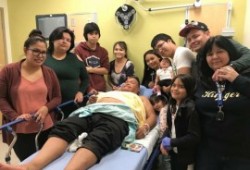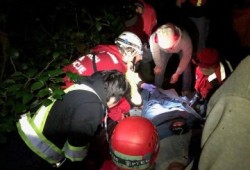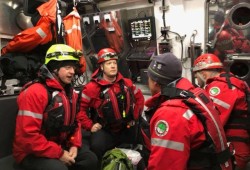Today Keith Atleo is grateful for all those who helped and supported him through a long 12-hour night March 15 and 16, high up on Waa-na-čas, or Lone Cone Mountain, on Meares Island.
The ordeal began when Keith was hiking Waa-na-čas with a group from a men’s retreat on the Lone Cone Campground. They were hiking the mountain he’d ventured on many times before.
“We were talking about traditional medicine and stories of the mountain and stuff like that,” said Keith who had been providing cultural support at the retreat. “I’d climbed the mountain many times and it was never that difficult.”
Keith didn’t know that his lungs were being challenged by a blood clot that was making it hard for his body to get the oxygen he needed. He had a few warning signs on the way up the mountain.
“I got dizzy a couple times going uphill,” he said. “We lost track of time and then going down the mountain, because it was getting dark, we started going faster.”
His body gave him a couple more warnings signs. Then he collapsed while descending and lost consciousness.
“I got dizzy a couple more times and I collapsed at about the-400 metre mark on the way down,” said Keith. “It was pretty dark out. We weren’t lost or anything. We knew where we were on the trail. Then that’s all I remember.”
That was the start of a long 12-hour night.
Keith said his collapse happened around 8:30 p.m. on March 15.
“I remember waking up in a stretcher,” he said.
Immediately after Keith collapsed rescue efforts were initiated. Facebook was flooded with requests for support and updates about the rescue.
When he woke up Keith was confused.
“I recall guys that were at the campground helping me out,” he said. “They called for help. There was a number of people that helped through the night like Search and Rescue, the Coast Guard and paramedics from Tofino and our neighboring tribe, Tla-o-qui-aht, and then people from Ahousaht and some people from Tofino.”
West Coast Search and Rescue estimated at least 25 people responded from the Lone Cone Campground, the nearby village of Opitsaht and the other villages in Ahousaht and Tla-o-qui-aht territory. People offered assistance in many ways: some were hands on with the rescue while others brought food and warm drinks.
“I remember seeing a bunch of different faces when they were trying to pack me out,” said Keith.
Among those faces was a team from the West Coast Search and Rescue. The team was transported from Tofino to Meares Island by the Coast Guard and then hiked through mud up a slippery trail for 45 minutes before they reached Keith.
They describe the extraction on their facebook page: “We had a great group of volunteers from the Ahousaht and Tla-o-qui-aht First Nations giving us a total of 27 people to start the carry at just after one in the morning. We initially hoped for a helicopter extraction but nothing was available so we set off down the steep section of the trail using MPDs (multi-purpose devices) for rope assist and with the BCAS (British Columbia Ambulance Service) paramedics monitoring.”
For five hours in in the dark the team worked steadily using caterpillar passes on the steep slippery terrain with many switch backs.
“The trail is difficult so we were continually doing caterpillar passes,” stated the Facebook page. “After almost five hours of this it became clear that we would not be able to complete the carry with a dwindling number of exhausted volunteers and in the nick of time the Cormorant from 442 Squadron came in and winched him out through quite dense trees - those guys are amazing!”
Comments of gratitude and inspiration were heard around Tofino for many days about the power of people working together.
One member of the West Coast Search and Rescue team, Liam McNeil, put it this way, “In terms of seeing all the people from differing communities coming together it was very powerful: Tofino , Tla-o-qui-aht, Ahousaht. Without the combined efforts of every individual present it would have been a more challenging.”
Keith was flown to a hospital in Comox where he was surrounded by his family and received the medical attention he needed. His body again can get all the oxygen it needs.
“I’m very grateful for anybody that helped out,” said Keith, “families and friends for their prayers, concern and all the calls and messages I got through social media, my phone, my wife and my family.”










